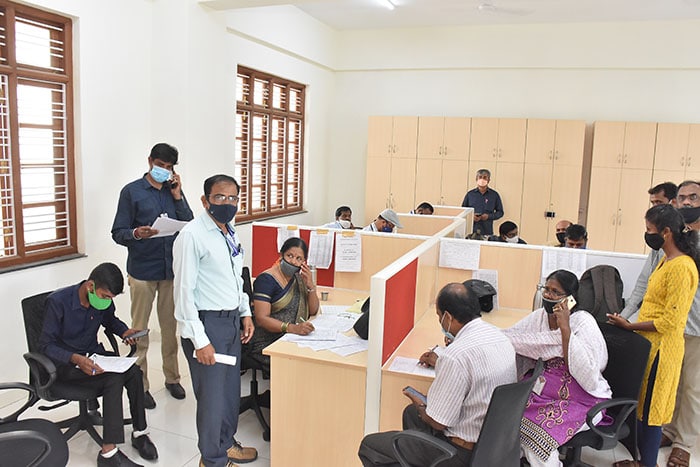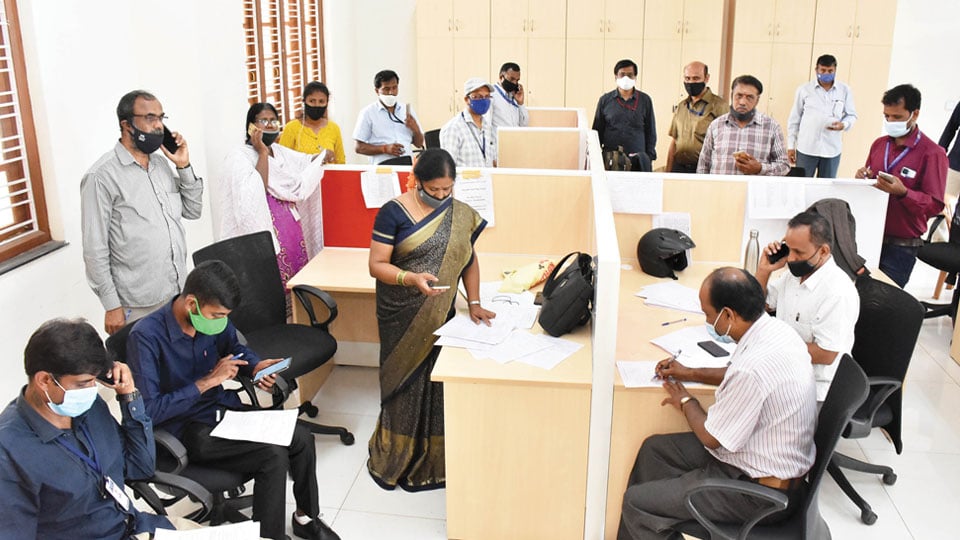Ensuring health management of those in home quarantine so that depression is kept at bay
Mysore/Mysuru: In the absence of a medical cure for COVID-19, the needed response is a simple public health strategy of isolation for those infected or at risk, reduced social contact to slow the spread of the virus and simple hygiene such as hand-washing, wearing masks and avoid contacts to reduce the risk of infection.
While isolation will achieve its goal to some extent, it leads to reduced access to support from family and friends. Isolation cuts off normal social support systems and causes loneliness and is a risk for worsening anxiety and depressive symptoms.
If left untreated, these psychological symptoms may have long-term health effects on patients and require treatment adding to the cost burden of managing the illness. This is where the crucial counselling aspect comes in. Delivery of healthcare services — where distance is a critical factor — by all healthcare professionals, volunteers and teachers using information and communication technologies is critical.
Mysuru has a dedicated Telemedicine Team comprising 25 members who counsel over 7,000 home-isolated patients every day and monitor their health. The team operates from the new Deputy Commissioner’s Office on Bannur Road and senior teachers, volunteers, professional counsellors and also medical professionals are constituents of the team.
Health watch and beating boredom
The team has its task cut out as far as isolation is concerned. During calls and conversations, the counsellors persuade a patient to self-quarantine at home and at the same time ensure that his mental well-being is undisturbed during the period. The team also monitors them so that they do not move out of homes or come into contact with the general public out of boredom.
The Telemedicine Team has been constituted under Food and Civil Supplies Department Deputy Director J. Shivanna and Assistant Director Satish. The team has a responsibility to counsel patients though they are not professional counsellors. Mostly they speak out of their experience and also a brief training provided by the District Administration is helping them to speak to the patients and understand their needs.
Some of the volunteers, apart from senior teachers, include medico social workers with experience in public health and community medicine. They convince patients of the seriousness of the situation and so far thousands of counselling sessions have been held to ensure that those in home quarantine do not slip into depression. Also, their medical condition monitored.

7,246 home-isolated patients
The contact details, address, attendants of the home isolation patients are furnished to the team and counsellors take over at this juncture. From the first wave, the number of calls has only increased and as on date, there are 7,246 home-isolated patients who need counselling.
Starting from the morning breakfast to dinner, the counsellors map the daily routine of the patients and they are advised to have nutritious food as prescribed by the Government. The diet chart is conveyed to the patients. Each patient is thoroughly monitored for 17 days. While the first 10 days is critical as this is the time when health complications surface and when patients need a lot of mental support. The remaining seven days will be monitoring and counselling.
Treating with empathy
“The stigma attached to COVID19 can prevent people from seeking immediate healthcare. We encourage them to adopt healthy behaviour. All our counsellors have been told to show empathy. Our main intention is to help patients understand the disease and combat it by adopting effective, practical measures,” Telemedicine Team in-charge Satish told Star of Mysore.
“COVID is a unique challenge. Though telemedicine will not solve all the problems, it is important to evaluate and manage patients. Telemedicine can prevent the transmission of the disease and it reduces risk to other members of the family. Also, avoidable exposure of the people involved in the delivery of healthcare can be avoided using telemedicine and patients can be screened remotely,” he added.








Recent Comments